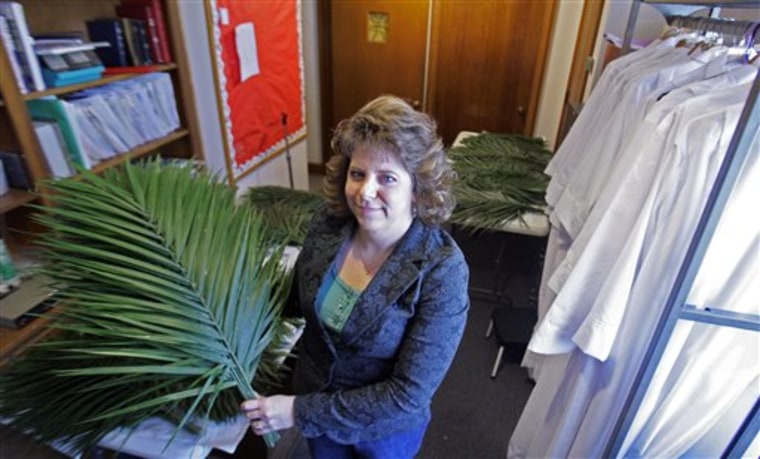Christian churches in the U.S. are turning over a new leaf for Palm Sunday.
About 2,500 congregations from every major denomination this weekend will use fair-trade palm fronds in their annual celebration of Jesus' arrival in Jerusalem in the days before his crucifixion. They say it's the Christian thing to do.
"We believe that God created the Earth, and it's our job to preserve it the best we can," said Laura Hudson, the administrator at Holy Trinity Lutheran Church in Columbus, Ohio, where about 300 fronds were delivered Wednesday and placed amid hanging robes in a chilled storage office.
According to tradition, Jesus rode into Jerusalem on a donkey as followers spread palm branches in his path, indicating that a dignitary was arriving in triumph. Today, Christians often burn the palms used in Palm Sunday services and preserve the ashes for use in the following year's celebration of Ash Wednesday, marking the beginning of Lent.
The University of Minnesota's Eco-Palms program ensures the leaves were harvested in Mexico and Guatemala in an environmentally sensitive manner by workers getting paid a fair price, and organizers say they are getting more orders than ever.
This Sunday, when Christians begin Holy Week celebrations, about 640,000 of the palm fronds will be passed around in about a dozen denominations.
That's a steep increase from the 5,000 stems ordered by 22 churches in 2005, said Dean Current, who directs the program at the university's Center for Integrated Natural Resources and Agricultural Management.
Sourced from Guatemala, Mexico
The project grew from a 2001 study on the effects of the North American Free Trade Agreement to a 2005 pilot project that today has become a $4.5 million business.
The project ensures workers get a higher wage for picking only the highest-quality fronds from palm trees growing wild in the rainforests of northern Guatemala and southern Mexico's Chiapas state, a practice that allows the plants to continue growing.
Organizers believe that the poor villagers who harvest the fronds — many of whom live on less than $2 a day — would otherwise cut down the rainforest to establish farms, Current said.
And communities also benefit through an annual rebate. The program this year, for example, will send about $32,000 to 10 communities in Guatemala. Money in the past has been used for scholarships for girls and to supplement teacher salaries.
The project has been an easy sell to churches in the United States, many of which were already promoting fair trade chocolate and coffee to congregants, said Kattie Somerfeld, a coordinator at Lutheran World Relief in Baltimore.
"The idea that you want to pay the people at the bottom of that value chain enough to feed their families and send their kids to school is something that our congregations were already in the habit of doing," she said.
Scott Jewett, a seminary student in Bexley, Ohio, said he had not realized until last year that churches were unintentionally supporting over-harvesting by buying the traditionally used palm fronds that tend to be longer.
'Using creation responsibly'
After reading about the Eco-Palms project in a magazine, he persuaded the pastor and others at Holy Trinity Lutheran Church to order from Eco-Palms, even though orders cost about $20 more.
"We're using creation responsibly, in addition to celebrating Palm Sunday," he said. "And as far as I know, nobody really has a problem with it."
And that's pretty much how word has spread — from one environmentally conscious church member to another, and on to other nearby congregations.
This year's orders increased for the fourth straight year — pretty good, considering overall sales for the floral industry have declined along with the economy, Somerfeld said.
Eventually, organizers hope to have environmentally friendlier palm fronds widely available in the U.S. through wholesalers and retailers, she said.
But while the project injects more money into poor villages and families, it may be only a provisional remedy to poverty, said George Dyer, a researcher at the University of California, Davis, who studies economic development and agricultural economics.
The higher prices could motivate better-off households to start harvesting palms, he said. The project will help increase the income of the poorest households only if they aren't eventually pushed aside.
